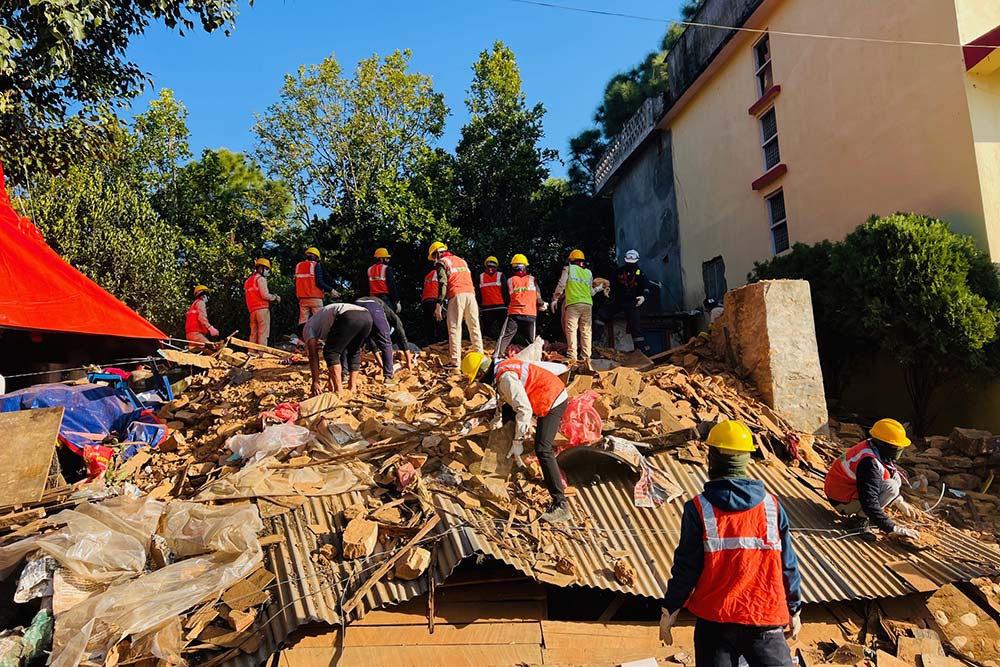
By Ujeena Rana
While rumours have been adrift about Uber making its presence in Nepal, the speculations have yet to materialise. Uber was launched in 2009 and is and American technology company operating in more than 600 cities worldwide. It develops, markets and operates Uber transportation and delivery mobile apps. Not quintessentially Uber-ish in nature, but many independent taxi drivers in Kathmandu have been long working on ‘on call’ basis. However, there is change in the air. A few startups are investing in ride-sharing and ride-hailing apps to facilitate the commuting experience of the valley populace. To benefit from such services, a customer needs to download the app first, register, feed information regarding the pickup and drop location, request a ride and the driver whoever is closest to the customer’s vicinity responds. You take the ride. You pay. As simple as that! Sounds familiar? Well, Uber, Ola, Grab Taxi and multitudes of taxi-hailing apps operating in major cities across the globe provide services following similar methodology. In Kathmandu, we have Kawa Rides, Sarathi Cab, Onver Smart Taxi, Eddy Cab and Tootle Today (a motorcycle ride sharing app). The deciding factors separating one from the other are the service, app reliability and user friendliness. However, if we are to see Uber’s trajectory, it has not been a smooth sail throughout. Uber is infamous for putting taxis out of business. In New York City alone, Fox 5 reported that the taxi industry has lost about 13 percent of revenue because of Uber. According to Business Insider, the latest victim of Uber is Yellow Cab, the largest taxi company in San Francisco. Even though taxi-hailing startups in Nepal do not emulate Uber’s business model document verbatim, there have been incidences during the trial phase when Sarathi was threatened by taxis who tried to flex their muscles but “we invariably asked them to come on board since they would benefit from the collaboration most. The service is not just for customers but taxi drivers as well as they can earn at the very least a fixed figure every month,” informs Ravi Singhal. He founded Sarathi along with Prakash Neupane. According to Om Khadka, founder at Onver, this business idea essentially assists daily wage earners (here taxi drivers) as well as promotes and manages a better taxi service. “We work in collaboration and with the cooperation of the taxi association. We are here to institutionalise the operation of taxi service. There should not be any bad blood between ridehailing taxi service providers and taxi unions,” states Khadka.
Motorcycle ride-sharing and taxi-hailing apps have caught the interest of Kathmandu dwellers for the right reasons. Understandably, in the context of Kathmandu, these services were conceived to do away with problems faced by passengers. Taxis rarely run on meter, bargaining is the norm, taxi drivers reject a customer outright since the destination of the ride does not match their liking and usually taxi drivers quote whatever number fancies them. Worse when it rains! It is more about working on their whim; the eccentricity of the drivers is unmatchable. “We are here to change that—change the taxi ride experience in Kathmandu,” asserts Singhal.
The ride-hailing taxi services are fundamentally app based. Should they go against the grain of their business model, things can go haywire. Case in point, I tried to book a taxi from Kawa to travel from work to home, however, since iOS was under development, I could not download the app on my phone. I made a request to accommodate my order. However, connection with the cab driver was unachievable. “If we try to jump the automated system, failure in getting service is unavoidable,” was their reply. “We have perfected the android part; we are fine-tuning the iOS system. By the time this story gets published, it should be ready for iOS users as well,” asserts Vinayak Prasad, co-founder at Kawa (Kawa in Newari translates to ‘Come and Get Me’). Likewise, Tootle matches you with bikers that are on your way. It imbibes the concept of shared economy. One factor Tootle is putting its foot firm on is that it is purely app based. No phone requests are entertained. “We want to push the behaviour of sharing and at the same time make it technology relevant,” stresses Sixit Bhatta, Co-founder at Tootle.
Challenges are many for such start-ups in Nepal. The primary impediment being an unreliable network. Second in line is fuel shortage followed by poor infrastructure. Besides, it is a new industry, therefore roadblocks are obvious. Promotion and marketing, in most cases, is still a ‘to do’ in the activity list; not to forget, educating people about the use of apps for services demands time. Along with these, Bhatta, shares that a long list of short and long term challenges awaits them at every corner. There have been reports about Tootle’s brush with traffic police (unlike taxis, bikes are registered as private vehicle - for entirely private purpose - and DoTM does not approve of bikes being used for commercial purposes). But Bhatta confesses that no government body has contacted them directly regarding this matter till date. “Ours is a ride-sharing service,” informs Bhatta. “There is no precedence to our kind of business model” therefore they are still testing the operating system. If two-wheeler is your preferred means of transport, your go-to app is Tootle.
According to Om Khadka, founder at Onver, this business idea essentially assists daily wage earners (here taxi drivers) as well as promotes and manages a better taxi service. “We work in collaboration and with the cooperation of the taxi association. We are here to institutionalise the operation of taxi service. There should not be any bad blood between ridehailing taxi service providers and taxi unions,” states Khadka.
Motorcycle ride-sharing and taxi-hailing apps have caught the interest of Kathmandu dwellers for the right reasons. Understandably, in the context of Kathmandu, these services were conceived to do away with problems faced by passengers. Taxis rarely run on meter, bargaining is the norm, taxi drivers reject a customer outright since the destination of the ride does not match their liking and usually taxi drivers quote whatever number fancies them. Worse when it rains! It is more about working on their whim; the eccentricity of the drivers is unmatchable. “We are here to change that—change the taxi ride experience in Kathmandu,” asserts Singhal.
The ride-hailing taxi services are fundamentally app based. Should they go against the grain of their business model, things can go haywire. Case in point, I tried to book a taxi from Kawa to travel from work to home, however, since iOS was under development, I could not download the app on my phone. I made a request to accommodate my order. However, connection with the cab driver was unachievable. “If we try to jump the automated system, failure in getting service is unavoidable,” was their reply. “We have perfected the android part; we are fine-tuning the iOS system. By the time this story gets published, it should be ready for iOS users as well,” asserts Vinayak Prasad, co-founder at Kawa (Kawa in Newari translates to ‘Come and Get Me’). Likewise, Tootle matches you with bikers that are on your way. It imbibes the concept of shared economy. One factor Tootle is putting its foot firm on is that it is purely app based. No phone requests are entertained. “We want to push the behaviour of sharing and at the same time make it technology relevant,” stresses Sixit Bhatta, Co-founder at Tootle.
Challenges are many for such start-ups in Nepal. The primary impediment being an unreliable network. Second in line is fuel shortage followed by poor infrastructure. Besides, it is a new industry, therefore roadblocks are obvious. Promotion and marketing, in most cases, is still a ‘to do’ in the activity list; not to forget, educating people about the use of apps for services demands time. Along with these, Bhatta, shares that a long list of short and long term challenges awaits them at every corner. There have been reports about Tootle’s brush with traffic police (unlike taxis, bikes are registered as private vehicle - for entirely private purpose - and DoTM does not approve of bikes being used for commercial purposes). But Bhatta confesses that no government body has contacted them directly regarding this matter till date. “Ours is a ride-sharing service,” informs Bhatta. “There is no precedence to our kind of business model” therefore they are still testing the operating system. If two-wheeler is your preferred means of transport, your go-to app is Tootle.
 Business leaders swear by the statement - Adapt to succeed. The startups in their own ways have each adapted to the climate of Kathmandu. Customer feedback on the driver is optional in most cases for now. Also the payment system varies. For example, Tootle categorically endorses digital payment. Therefore they have partnered with e-Sewa. Nonetheless, in absence of a reliable and easily accessible proper e-payment system, users may pay in cash. Whereas, Kawa drivers happily take cash. “We do not want to burden our customers and drivers with another online gateway. Kathmandu is not ready for online payment yet,” comments Vinayak. However, Sarathi prefers card/cash or wallet whichever is convenient to the passenger. “We are not here to impose technology upon our customers,” states Singhal. The IT start-ups suffer miserably in the lack of payment getaway. Mobile cash is a concept Nepal is yet to familiarise itself with. The underlying message is that the country needs more time to develop Kathmandu as a smart city.
Business leaders swear by the statement - Adapt to succeed. The startups in their own ways have each adapted to the climate of Kathmandu. Customer feedback on the driver is optional in most cases for now. Also the payment system varies. For example, Tootle categorically endorses digital payment. Therefore they have partnered with e-Sewa. Nonetheless, in absence of a reliable and easily accessible proper e-payment system, users may pay in cash. Whereas, Kawa drivers happily take cash. “We do not want to burden our customers and drivers with another online gateway. Kathmandu is not ready for online payment yet,” comments Vinayak. However, Sarathi prefers card/cash or wallet whichever is convenient to the passenger. “We are not here to impose technology upon our customers,” states Singhal. The IT start-ups suffer miserably in the lack of payment getaway. Mobile cash is a concept Nepal is yet to familiarise itself with. The underlying message is that the country needs more time to develop Kathmandu as a smart city.
 Onver claims to be the first to provide the cab-hailing service in Kathmandu. “We started our research and trial and error sessions as early as 2014. But due to the 2015 earthquake and the blockade, we halted services. From December 2016 onwards, we aggressively invested in promotion and service,” informs Khadka. As far as Onver is concerned, they have online (app) and offline (call center) services to book a taxi. Presently only android users can benefit from their service. They claim that iOS users have to wait for six more months. “Our eventual plan is to make it entirely app based but it takes time to make people habituated to using apps for services,” remarks Khadka.
Kawa kick-started with 125 cabs. By September the plan is to connect with 200 cabs. Whereas Sarathi’s plan is to have 300 cabs with the company’s sticker running on the streets of Kathmandu come September. “We have leased out taxis for five years. Basically, they are under our control for that time period. We have to take care of the taxis in terms of fuel, drivers, maintenance, etc.,” shares Singhal.
Onver claims to be the first to provide the cab-hailing service in Kathmandu. “We started our research and trial and error sessions as early as 2014. But due to the 2015 earthquake and the blockade, we halted services. From December 2016 onwards, we aggressively invested in promotion and service,” informs Khadka. As far as Onver is concerned, they have online (app) and offline (call center) services to book a taxi. Presently only android users can benefit from their service. They claim that iOS users have to wait for six more months. “Our eventual plan is to make it entirely app based but it takes time to make people habituated to using apps for services,” remarks Khadka.
Kawa kick-started with 125 cabs. By September the plan is to connect with 200 cabs. Whereas Sarathi’s plan is to have 300 cabs with the company’s sticker running on the streets of Kathmandu come September. “We have leased out taxis for five years. Basically, they are under our control for that time period. We have to take care of the taxis in terms of fuel, drivers, maintenance, etc.,” shares Singhal.
 Technology is an intrinsic part of such app services but training of drivers is an integral element that determines the success of the business. Use of smart phone by drivers is accompanied by their familiarity with GPS, digital mapping with internet. What is assuring about these app-based services is the facility of tracking system categorically for the security of the customers. “All drivers go through a training session. We educate our drivers on technological and behavioural aspects. The company provides them with mobile, data and SIM card. Also, each car is equipped with GPS. Kawa cabs in a radius of 400m around you can offer you a ride,” informs Vinayak. Kawa promotes itself as a tech company which outsources their transportation to specific drivers. They have individual contract with each taxi driver. Sarathi offers ride in premium cabs as well, however, Kawa claims to have read the political situations in the country well. They first want to work with normal cars—Eon and Alto—and slowly add premium range automobiles. “Currently, we are pitching licence from DoTM for the same purpose,” comments Binayak.
A breath of fresh air: these cabs run strictly on meter! To put their assertion to test, I tried Onver Smart Taxi service. After bargaining, normally, a taxi agrees to go from Naxal to Dhapasi Height at Rs. 350. Onver cab, on meter, cost me Rs. 215. Of course, many factors decide the total fare - traffic congestion on a given day and time, route, speed and skill of a taxi driver. However, there was no GPS in the taxi, nothing technologically challenging for the taxi driver, but eventually Onver like other taxi-hailing startups will perfect their game. The plan is to transform the service to complete app-based. But till then, a couple of them will function in the old school method.
The more number of taxis working efficiently and effectively under such start-ups; the better for customers. It would be premature to comment on the sustainability of each venture as yet, but what is undeniable is the fact that these app services answer a definite need.
Technology is an intrinsic part of such app services but training of drivers is an integral element that determines the success of the business. Use of smart phone by drivers is accompanied by their familiarity with GPS, digital mapping with internet. What is assuring about these app-based services is the facility of tracking system categorically for the security of the customers. “All drivers go through a training session. We educate our drivers on technological and behavioural aspects. The company provides them with mobile, data and SIM card. Also, each car is equipped with GPS. Kawa cabs in a radius of 400m around you can offer you a ride,” informs Vinayak. Kawa promotes itself as a tech company which outsources their transportation to specific drivers. They have individual contract with each taxi driver. Sarathi offers ride in premium cabs as well, however, Kawa claims to have read the political situations in the country well. They first want to work with normal cars—Eon and Alto—and slowly add premium range automobiles. “Currently, we are pitching licence from DoTM for the same purpose,” comments Binayak.
A breath of fresh air: these cabs run strictly on meter! To put their assertion to test, I tried Onver Smart Taxi service. After bargaining, normally, a taxi agrees to go from Naxal to Dhapasi Height at Rs. 350. Onver cab, on meter, cost me Rs. 215. Of course, many factors decide the total fare - traffic congestion on a given day and time, route, speed and skill of a taxi driver. However, there was no GPS in the taxi, nothing technologically challenging for the taxi driver, but eventually Onver like other taxi-hailing startups will perfect their game. The plan is to transform the service to complete app-based. But till then, a couple of them will function in the old school method.
The more number of taxis working efficiently and effectively under such start-ups; the better for customers. It would be premature to comment on the sustainability of each venture as yet, but what is undeniable is the fact that these app services answer a definite need.
Published Date: September 14, 2017, 12:00 am
Post Comment
E-Magazine

Click Here To Read Full Issue
RELATED Feature




